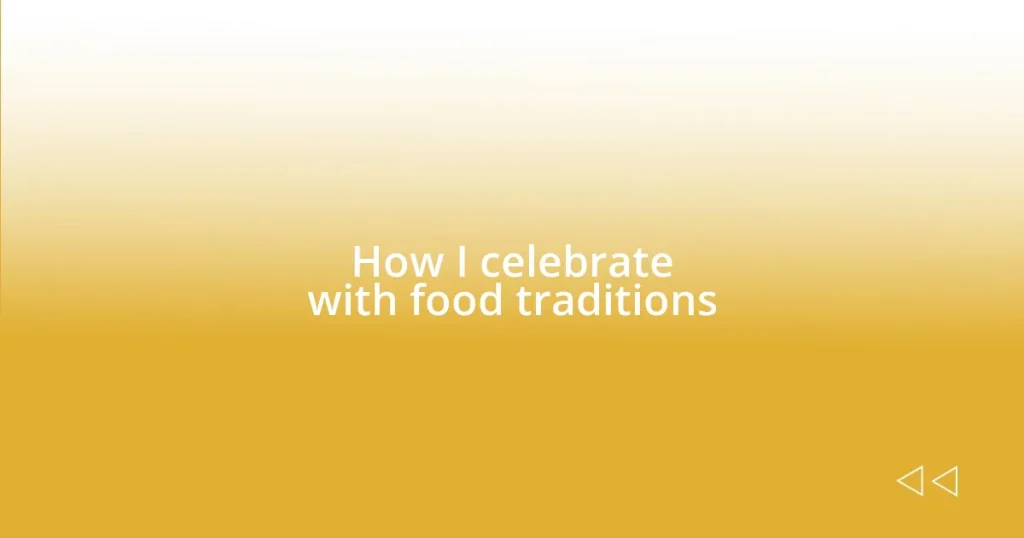Key takeaways:
- Food traditions connect generations and enhance cultural heritage, serving as emotional anchors and symbols of celebration.
- Shared meals foster community bonds and meaningful conversations, enriching relationships through collective experiences.
- Incorporating meaningful ingredients reflects personal and cultural significance, turning meals into storytelling moments.
- Customs surrounding food celebrations highlight the values of a community and create connections through shared culinary experiences.

Understanding food traditions
Food traditions hold a unique place in cultures around the world, often serving as a bridge between generations. I remember sitting at my grandmother’s kitchen table as the aroma of spices filled the air, each dish telling a story of its own. Have you ever considered how a single meal can evoke memories and emotions, linking us to our heritage?
These traditions often go beyond mere sustenance; they are infused with meanings, rituals, and values that shape our identities. For instance, I’ve always found it fascinating how certain dishes are reserved for special occasions, like the homemade tamales my family makes every holiday season. Isn’t it amazing how the act of preparing and sharing food can reinforce bonds within families and communities?
As I reflect on my experiences, I see how food can be a source of comfort during difficult times, reminding us of resilience. When I was feeling low during a tough period, a simple bowl of chicken soup made by my mother felt like a warm hug. How do your favorite meals provide comfort and solace in your life?

Importance of food in celebrations
Food is much more than just a meal on special occasions; it’s a centerpiece of celebration and connection. I recall one birthday when my friends and I gathered around a decadent chocolate cake, each slice bringing laughter and stories to life. Those moments weren’t just about satisfying our hunger; they were about sharing joy and creating memories that lingered long after the dishes were cleared. How many times have you found yourself reminiscing about a gathering simply because of the food shared?
When I think about holiday gatherings, I remember the time my family cooked a traditional feast to celebrate New Year’s. The table overflowed with vibrant dishes, each representing prosperity and good fortune. It wasn’t just what was on the plate; it was the love, effort, and shared experiences that made those meals so significant. In moments of celebration, food truly transforms into a symbol of unity, fostering a sense of belonging and togetherness that I cherish deeply.
One of my favorite childhood memories is the aroma of my mother’s baked ziti wafting through the house during family reunions. It wasn’t just the taste that resonated with us but also the stories exchanged around the table. Food has a remarkable ability to spark conversation and laughter, drawing people closer as they share their lives over a meal. Have you ever noticed how a well-prepared dish can ignite a vibrant discussion among friends and family?
| Element | Significance |
|---|---|
| Food as Tradition | Connects generations and honors heritage. |
| Shared Meals | Reinforce bonds and foster community. |
| Emotional Connection | Provides comfort and evokes cherished memories. |
| Symbol of Celebration | Transforms gatherings into meaningful events. |

Popular cultural food traditions
Food traditions vary widely across cultures and regions, reflecting the diversity of human experience. I once attended a Diwali celebration where the air was fragrant with the scent of homemade sweets like gulab jamun and jalebi. The joy on everyone’s faces as they shared these treats created a unique bond that transcended our cultural differences. It’s incredible how a plate of food can unite so many people, making them feel like family.
Here are some popular cultural food traditions that often bring people together:
- Mexican Day of the Dead: Families prepare altars with favorite foods of departed loved ones, celebrating their lives with offerings of tamales, pan de muerto, and marigolds.
- Chinese New Year: Dishes like dumplings and fish symbolize wealth and prosperity, and the act of sharing these meals signifies family unity.
- Italian Feast of the Seven Fishes: On Christmas Eve, families traditionally gather to enjoy a dinner of seven different seafood dishes, embodying both abundance and togetherness.
- Japanese Hanami: During cherry blossom season, people gather for picnics featuring sakura mochi and bento boxes, honoring nature’s beauty while enjoying a seasonal feast.
These traditions not only nourish our bodies but also feed our souls, weaving the fabric of our shared humanity. Each bite carries a story, resonating through generations, and that’s something I truly cherish.

Preparing traditional dishes
Engaging in the art of preparing traditional dishes is a heartfelt ritual that I look forward to every year. I vividly remember the thrill of kneading dough for homemade pierogi with my grandparents during winter holidays. It was more than just cooking; it was a way to bond and learn the significance of each ingredient and its place in our family history. Have you ever felt that spark of connection when cooking with loved ones?
As I mix and chop, I often reflect on how every dish we prepare carries whispers of our heritage. For instance, my mother’s recipe for paella stretches back generations, and I can almost hear my grandmother’s voice guiding me as I add saffron. The vibrant colors of the ingredients remind me not just of the meal itself but of the stories surrounding it, igniting a sense of pride. Isn’t it amazing how food can enrich our understanding of who we are?
The process of cooking traditional dishes can also be a source of comfort during challenging times. I recall a tough week when I opted to whip up my family’s famous gumbo. As I layered flavors and let the pot simmer, I felt a wave of nostalgia wash over me, transforming the kitchen into a sanctuary. In moments like these, I realize that preparing meals isn’t merely about nourishment; it’s about reviving memories and forging deeper connections. Isn’t it comforting to know that with each dish, we can reconnect with our roots?

Incorporating ingredients meaningfully
Incorporating ingredients meaningfully goes beyond just following a recipe; it’s about honoring the context in which those ingredients exist. For example, I remember a summer family gathering where we celebrated with a fresh batch of pesto made from our garden-grown basil. The aroma of the herbs, mixed with garlic and olive oil, took me back to my childhood visits to my grandmother’s house in Italy. Have you ever experienced a scent that brings memories flooding back?
When choosing ingredients, I believe it’s important to consider their cultural significance. In my own celebrations, I often include local produce to create traditional dishes that reflect the season and my community. One year, I was inspired to bake a pumpkin pie for Thanksgiving using squash from a friend’s farm, intertwining my family’s tradition with a nod to local agriculture. It was a beautiful blend of flavors and stories that united us around the table.
I’ve also found that adding a personal touch to traditional recipes can transform the whole experience. I can remember making a favorite family dish, chicken adobo, and decided to throw in a twist by adding some smoked paprika for depth. It not only enhanced the flavor but sparked conversations about how recipes evolve over time. Isn’t it fascinating how every ingredient we choose can tell a story about where we’ve come from and who we are today?

Sharing meals with loved ones
Sharing meals with loved ones is truly a cherished ritual in my life. I fondly recall family Sunday dinners at my aunt’s house, where we’d gather around a sprawling table filled with traditional dishes. The clinking of forks and laughter was a comforting backdrop as we exchanged stories, reminding me that food is just a catalyst for deeper connections. Have you ever noticed how a delicious meal can spark meaningful conversations?
Every holiday feels incomplete without sharing a meal with those I love. Last Thanksgiving, as we sat down to enjoy a feast of turkey and all the trimmings, I was enveloped in warmth and gratitude. My cousin began reminiscing about our childhood holiday traditions, and I realized that these shared experiences have stitched our family together. Isn’t it incredible how a simple act of eating can weave the fabric of our relationships?
What stands out to me during these meals is the sense of belonging. When I host gatherings, I love including dishes that have significance to my friends and family. One dinner, I encouraged my guests to bring a dish that represented their heritage, and the table transformed into a beautiful mosaic of cultures. It was a celebration of diversity that deepened our friendships and gave everyone a chance to share their story. Don’t you think that sharing meals is a beautiful way to honor our unique backgrounds while strengthening bonds?

Customs surrounding food celebrations
Customs surrounding food celebrations are often deeply rooted in culture and family traditions. I remember the first time I attended a Lunar New Year feast with friends; the sight of the vibrant dumplings and the sound of firecrackers gave the event an air of anticipation and joy. Have you ever felt the energy of a meal where every dish carries its own story and tradition?
One particularly memorable celebration I participated in was during Diwali, where the array of sweets and savory snacks overwhelmed the senses. Preparing and sharing these dishes became a ritual, each recipe connected to generations past. It struck me how food can create a bridge between the present moment and our ancestors. Isn’t it remarkable how a single meal can transport us to another time and place?
I believe that food traditions also reflect the values of a community. For example, in my neighborhood, we celebrate harvest season with a potluck, inviting everyone to bring a dish made from seasonal ingredients. It’s heartwarming to see familiar faces and try new flavors that tell individual stories tied to our shared love of food. How does it feel to connect with others through something so universal as a meal? It’s this connection that turns a simple gathering into a meaningful celebration.















